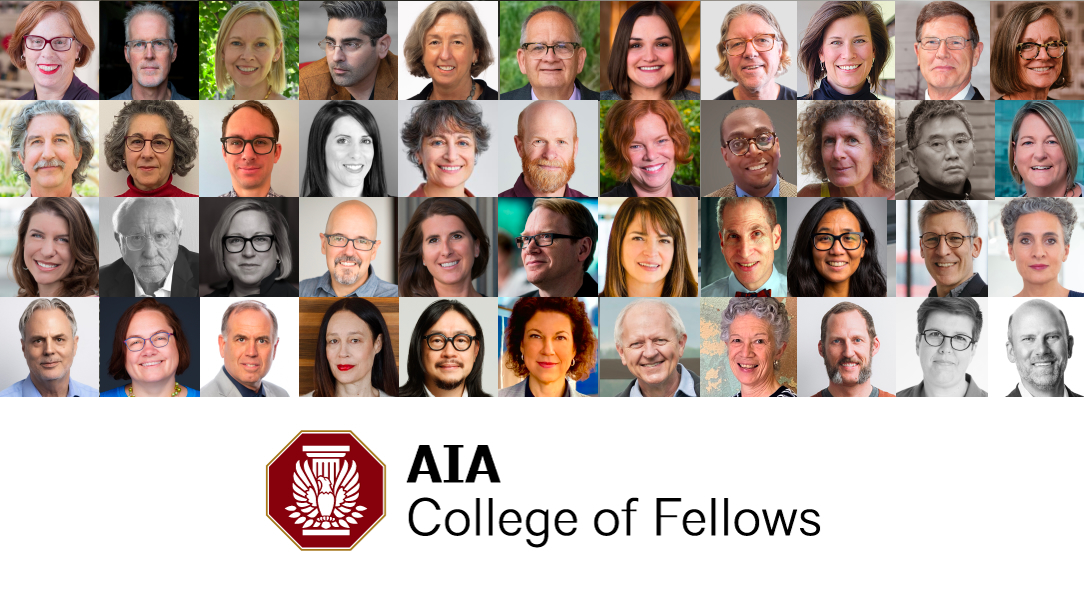The American Institute of Architects (AIA) is elevating 96 member-architects and 2 non-member-architects to its College of Fellows, an honor awarded to architects who have made significant contributions to the profession.
The fellowship program was developed to elevate architects who have achieved a standard of excellence in the profession and made a significant contribution to architecture and society on a national level. Prospective candidates must have at least 10 years of AIA architect membership and demonstrated influence in at least one of the following areas:
- Promoted the aesthetic, scientific, and practical efficiency of the profession.
- Advanced the science and art of planning and building by advancing the standards of practice.
- Coordinated the building industry, and the profession of architecture.
- Ensured the advancement of the living standards of people through their improved environment.
- Made the profession of ever-increasing service to society.
- Advanced the science and art of planning and building by advancing the standards of architectural education and training.
Fellows are selected by a seven-member Jury of Fellows. This year’s jury included Chair Lisa Lamkin, FAIA, Brown Reynolds Watford Architects, Inc; Carl D'Silva, FAIA, Perkins + Will; Sanford Garner, FAIA, RGCollaborative; Margaret McFadden Carney, FAIA, Cornell University; Pamela Rew, FAIA, KSS Architects; Anne Schopf, FAIA, Mahlum and Lourdes Solera, FAIA, MCHarry Associates.
Here is a full list of the 2024 AIA College of Fellows:
Douglass Alligood, FAIA, AIA New York Chapter, BIG
Jeffrey W. Allsbrook, FAIA, AIA Los Angeles, Standard Architecture
Eric Amel, FAIA, AIA Minneapolis, Clow Berg, Inc.
Michelle Amt, FAIA, AIA Central Virginia, VMDO Architects, P.C.
William P. Babbington, FAIA, AIA Denver, a section of AIA Colorado, Studio NYL Inc.
David A. Bailey, FAIA, AIA Middle Tennessee, Hastings Architecture
Thomas R. Bassett-Dilley, FAIA, AIA Chicago, Tom Bassett-Dilley Architect, Ltd.
Nancy Beckner Bastian, FAIA, AIA Philadelphia, CBP Architects
Samuel P. Batchelor, FAIA , Boston Society of Architects/AIA, designLab Architects
Jill A. Bergman, FAIA, AIA San Francisco, HDR, Inc
Cary Bernstein, FAIA, AIA San Francisco, Cary Bernstein Architect
Lily D. Berrios, FAIA, AIA Atlanta, Sizemore Group LLC
Gina L. Bocra, FAIA, AIA New York Chapter, New York City Department of Buildings
Ann Marie Borys, FAIA, AIA Seattle, University of Washington Department of Architecture
Anthony R. Brower, FAIA, AIA Los Angeles, Gensler
Abigail R. Brown, FAIA, AIA Washington DC, Gensler
Nicholas W. Cameron, FAIA, AIA Chicago, Perkins & Will Chicago
Teri S. Canada, FAIA, AIA Triangle, EVOKE Studio Architecture
Shannon Christensen, FAIA, AIA Montana, Cushing Terrell
Ida A. Clair, FAIA, AIA Central Valley, State of California
Drew Deering, FAIA, AIA Chicago, Moody Nolan
Colin L. Drake, FAIA, AIA Central Kentucky, JRA Architects
Todd A. Erlandson, FAIA, AIA Los Angeles, March Studio
Gregory Faulkner, FAIA, AIA San Francisco, Faulkner Architects
Edward R. Ford, FAIA, AIA Central Virginia
Ronald H. Frantz, Jr., FAIA, AIA Central Oklahoma, University of Oklahoma, College of Architecture
Matthew H. Griffith, FAIA, AIA Triangle, in situ studio
Michael L. Guthrie, FAIA, AIA Detroit, INFORM Studio
Jim Hanford, FAIA, AIA Seattle, The Miller Hull Partnership LLP
Thomas RC Hartman, FAIA, AIA Western Massachusetts, C&H Architects
Erleen K. Hatfield, FAIA, AIA New York Chapter, Hatfield Group
John A. Hawkins, FAIA, AIA Southern Indiana, a section of AIA Indiana TowerPinkster
Julia E. Hawkinson, FAIA, AIA Los Angeles, Los Angeles Unified School District
David F. Herron, FAIA, AIA Kansas City, herron + partners
Kristen M. Hess, FAIA, AIA Triangle, HH Architecture
Nicole A. Hollant-Denis, FAIA, AIA New York Chapter, Aaris Design Architects
Robert L. Holzbach, FAIA, AIA Washingto DC, Hickok Cole
Tae S. Hong, FAIA, AIA San Francisco, YKH Associates
Gary B. Hoyt, FAIA, AIA Florida Gulf Coast, Hoyt Architects
Jeanne E. Huntsman, FAIA, AIA Charlotte, Willdan
Joyce Hwang, FAIA, AIA Buffalo/WNY, University at Buffalo, School of Architecture and Planning
Douglas J. Ito, FAIA, AIA Seattle, SMR Architects
Jason J. Jewhurst, FAIA, Boston Society of Architects/AIA, Bruner/Cott & Associates
Hana Kassem, FAIA, AIA New York Chapter, Kohn Pedersen Fox Associates PC
Jeffrey A. Kenoff, FAIA, AIA New York Chapter, Kohn Pedersen Fox Associates PC
Hao E. Ko, FAIA, AIA San Francisco, Gensler
Matthew P. Krissel, FAIA, AIA Philadelphia, Creative Lab 3
Silvia Kuhle, FAIA, AIA Los Angeles, Standard Architecture
Sameer Kumar, FAIA, AIA New York Chapter, Techne Architectural Design D.P.C.
John B. Lape, FAIA, AIA Portland, a section of AIA Oregon, John Lape, Architect
Julia M. Laue, FAIA, AIA San Francisco, San Francisco Bureau of Architecture
Kathleen M. Lechleiter, FAIA, AIA Baltimore, Twopoint Studio, LLC
Anderson L. Lee, FAIA, AIA Hong Kong, Index Architecture Limited
Frederick Marks, FAIA, AIA Palomar, a section of AIA San Diego AIA Palomar
Edward T. Marley, FAIA, AIA Southern Arizona, Swaim Associates Ltd. Architects
J. Leora Mirvish, FAIA, AIA Washington DC, Quinn Evans Architects- DC
Robert Misel, FAIA, AIA Seattle, The Miller Hull Partnership LLP
Paul A. Murdoch, FAIA, AIA Los Angeles, Paul Murdoch Architects
Tara L. Myers, FAIA, AIA Middle Tennessee, Earl Swensson Associates, Inc
Carey R. Nagle, FAIA, AIA Iowa, BNIM Architects
Irene M. Nigaglioni, FAIA, AIA Dallas, IN2 Architecture
Kevin R. Nordmeyer, FAIA, AIA Iowa, BNIM Architects
Francesca R. Oliveira, FAIA, AIA San Francisco, Skidmore, Owings & Merrill, LLP
Jeffrey Pastva, FAIA, AIA Philadelphia, Scannapieco Development Corp.
Ludmilla D. Pavlova-Gillham, FAIA, AIA Western Massachusetts, University of Massachusetts
Maria de los Angeles A. Pellot Peraza, FAIA, AIA Chicago, UrbanWorks, Ltd.
Jeffrey D. Peterson, FAIA, Boston Society of Architects/AIA, Peterson Architects
Gretchen Pfaehler, FAIA, AIA Washington DC, InSite Consulting Architects
John G. Pfluger, FAIA, AIA Minneapolis, Cuningham Group
Michael T. Pinto, FAIA, AIA Los Angeles, NAC Architecture
Mel Price, FAIA, AIA Hampton Roads, Work Program Architects
Anath Ranon, FAIA, AIA Baltimore, Quinn Evans Architects
Ripley A. Rasmus, FAIA, AIA St. Louis
Laura F. Sachtleben, FAIA, AIA Houston, Landscape Forms
Taal R. Safdie, FAIA, AIA San Diego, Safdie Rabines Architects
Mark J. Sanderson, FAIA, AIA Philadelphia, DIGSAU Architecture | Urbanism
Todd Scott, FAIA, AIA Seattle, King County Historic Preservation
Catherine Seavitt Nordenson, FAIA, AIA New York Chapter, Catherine Seavitt Studio
John A. Shoesmith, FAIA, AIA Seattle, Perkins Eastman
Kathrina Simonen, FAIA, AIA Seattle, University of Washington Department of Architecture
Sanford L. Smith, FAIA, AIA Orange County, Hoag Hospital
Jonathan D. Solomon, FAIA, AIA Chicago, Presservation Futures
Craig S. Spangler, FAIA, AIA Philadelphia, The Ballinger Company
Edward M. Steinfeld, FAIA, AIA Buffalo/WNY, IDEA Center, School of Architecture & Planning
Kent W. Suhrbier, FAIA, AIA Pittsburgh, Bohlin Cywinski Jackson
James Jesse Thompson, FAIA, AIA Maine, Kaplan Thompson Architects
Ann Thompson, FAIA, AIA Chicago, Related Midwest
A. J. Tinson, FAIA, AIA New York Chapter, Hart Howerton
Amanda H. Tullos, FAIA, AIA Houston, GreeNexus Consulting
Mark W. Vaughan, FAIA, AIA Dallas, Page Southerland Page
Moses Vaughan, FAIA, AIA San Francisco, WRNS Studio
Roderic K. Walton, FAIA, AIA Chicago, Moody Nolan
Bruce R. Wardell, FAIA, AIA Central Virginia, BRW Architects, P.C.
Tilman E. Wheeler, FAIA, AIA Chattanooga, Tinker Ma, Inc.
R. John Woelfling, FAIA, AIA New York Chapter, Dattner Architects
Paul S. Woolford, FAIA, AIA San Francisco, HOK Architects, Inc
2024 Honorary Fellows:
Héctor Esrawe, Hon. FAIA
Josep Miàs, Hon. FAIA
Related Stories
Building Technology | Jun 18, 2024
Could ‘smart’ building facades heat and cool buildings?
A promising research project looks at the possibilities for thermoelectric systems to thermally condition buildings, writes Mahsa Farid Mohajer, Sustainable Building Analyst with Stantec.
University Buildings | Jun 18, 2024
UC Riverside’s new School of Medicine building supports team-based learning, showcases passive design strategies
The University of California, Riverside, School of Medicine has opened the 94,576-sf, five-floor Education Building II (EDII). Created by the design-build team of CO Architects and Hensel Phelps, the medical school’s new home supports team-based student learning, offers social spaces, and provides departmental offices for faculty and staff.
Healthcare Facilities | Jun 18, 2024
A healthcare simulation technology consultant can save time, money, and headaches
As the demand for skilled healthcare professionals continues to rise, healthcare simulation is playing an increasingly vital role in the skill development, compliance, and continuing education of the clinical workforce.
Mass Timber | Jun 17, 2024
British Columbia hospital features mass timber community hall
The Cowichan District Hospital Replacement Project in Duncan, British Columbia, features an expansive community hall featuring mass timber construction. The hall, designed to promote social interaction and connection to give patients, families, and staff a warm and welcoming environment, connects a Diagnostic and Treatment (“D&T”) Block and Inpatient Tower.
Concrete Technology | Jun 17, 2024
MIT researchers are working on a way to use concrete as an electric battery
Researchers at MIT have developed a concrete mixture that can store electrical energy. The researchers say the mixture of water, cement, and carbon black could be used for building foundations and street paving.
Codes and Standards | Jun 17, 2024
Federal government releases national definition of a zero emissions building
The U.S. Department of Energy has released a new national definition of a zero emissions building. The definition is intended to provide industry guidance to support new and existing commercial and residential buildings to move towards zero emissions across the entire building sector, DOE says.
Multifamily Housing | Jun 14, 2024
AEC inspections are the key to financially viable office to residential adaptive reuse projects
About a year ago our industry was abuzz with an idea that seemed like a one-shot miracle cure for both the shockingly high rate of office vacancies and the worsening housing shortage. The seemingly simple idea of converting empty office buildings to multifamily residential seemed like an easy and elegant solution. However, in the intervening months we’ve seen only a handful of these conversions, despite near universal enthusiasm for the concept.
Healthcare Facilities | Jun 13, 2024
Top 10 trends in the hospital facilities market
BD+C evaluated more than a dozen of the nation's most prominent hospital construction projects to identify trends that are driving hospital design and construction in the $67 billion healthcare sector. Here’s what we found.
Adaptive Reuse | Jun 13, 2024
4 ways to transform old buildings into modern assets
As cities grow, their office inventories remain largely stagnant. Yet despite changes to the market—including the impact of hybrid work—opportunities still exist. Enter: “Midlife Metamorphosis.”
Affordable Housing | Jun 12, 2024
Studio Libeskind designs 190 affordable housing apartments for seniors
In Brooklyn, New York, the recently opened Atrium at Sumner offers 132,418 sf of affordable housing for seniors. The $132 million project includes 190 apartments—132 of them available to senior households earning below or at 50% of the area median income and 57 units available to formerly homeless seniors.

















